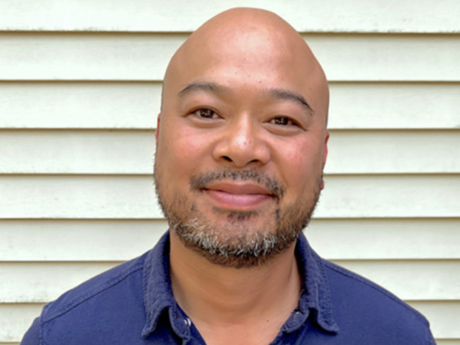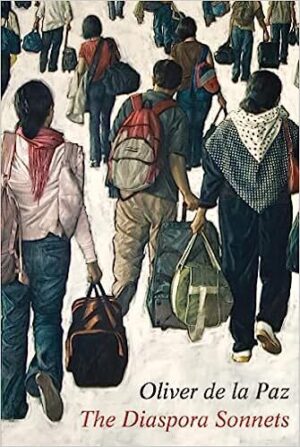In Their Own Words
Oliver de la Paz on “Pantoum Beginning and Ending with Thorns”

Pantoum Beginning and Ending with Thorns
Because of the way a border on a map twists into thorns
my father stood in line in a ruined country with ruined men.
We were footnotes on charred parchment. The boundaries, lost
at the precipice of a war, shifting on the hour in spliced histories.
My father stood in line in a ruined country with ruined men,
and what for? Did he imagine the desert he would bring us to?
At the precipice of a war, shifting on the hour in spliced histories,
the call to leave home throbbed inside him. Urgent pulses—
And what for? Did he imagine the desert he would bring us to?
Its thirsty and abandoned towns? There was a fire spreading within—
the call to leave home throbbed inside. Urgent pulses
crossed and uncrossed like tributaries on freshly inked maps.
In thirsty and abandoned towns, there was a fire spreading within
so he took us away because the country was ruled by swords
which crossed and uncrossed like tributaries on freshly inked maps.
And the guns would sound all night like feast days of saints.
He took us away because the country was ruled by swords
and men emblazoned with chevrons and pins.
And the guns would sound all night like feast days of saints
but really, there was more silence. There was worry and fear
And men emblazoned with chevrons and pins
would draw black Xes over places they’d conquered.
Really. Then more silence. Then worry and fear.
The flies would sing their hymnals in procession around the dead.
The black Xes over places now conquered.
Maps of provinces, cities, family lines drawn and redrawn.
The flies singing their hymnals in procession around the dead
and my father with a ticket to flee because home wouldn’t let us stay.
Maps of provinces, cities—family lines drawn and redrawn
into travelogues and diaries. Into stories passed in the night
like my father with a ticket to flee because home wouldn’t let us stay.
Hum of the plane engine. Hum of idling car. Hum of the outboard motor.
Into travelogues and diaries. Into stories passed in the night,
we were footnotes on a charred parchment. The borders lost
to the hum of planes, of idling cars, hum of outboard motors
because of the way the line on a map twists into thorns.
Reprinted from The Diaspora Sonnets (W. W. Norton, 2023). Reprinted with the permission of the author and publisher. All rights reserved.
On “Pantoum Beginning and Ending with Thorns”
In late 2019 I was invited to lead discussions about an installation piece in the Institute of Contemporary Art in Boston by the artist Reena Saini Kallat’s piece, Woven Chronicle. It was the first piece visitors of the museum would encounter for the exhibit “When Home Won’t Let You Stay” which featured contemporary artists responding to migration, immigration, and displacement. Kallat’s piece was a massive map of the world constructed out of wire crisscrossed into various color-coded continents and countries. Some barbed wire was interspersed throughout the installation and the piece emitted sounds like alarms. It was an extraordinary piece and as part of my conversation about the work I felt compelled to write a pantoum. I felt the braiding of lines that take place in the form was similar to what was taking place in the artwork. But I also sought to speak to my family’s own experiences.
We immigrated to the United States in 1972 after Ferdinand Marcos declared martial law. There was a lot of tumult surrounding our departure. My uncle was involved in some of the student uprisings and was placed on a blacklist and my father, who was helping my uncle pay for his schooling, was worried about how that would reflect on our family. We needed to flee and so the larger idea of the ICA exhibit, the theme of home not allowing us to stay, became the framework for the pantoum.
The early part of the poem where the speaker asks, “Did he imagine the desert he would bring us to?” was based on conversations I’ve had with my father about my family’s arrival in the Eastern part of Oregon which is plains desert and which lacked any Filipino community. Further, I wanted to call attention to other migration and immigration stories, and so I wrote about the varieties of vehicles used to depart like the “hum of the outboard motors” or the “hum of planes” as a nod to those who escaped via air like we did or via sea like so many others have.
I thought that a pantoum was a perfect form to illustrate a sense of entrapment. The form’s relentless circularity was a way for me to suggest the plight of people who had very few options available to them.



